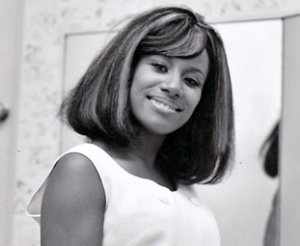It’s time for another installment of “Didja Know”? Last week we covered the almost original version of “Good Lovin'” which was recorded by the Olympics. The Rascals heard their record, recorded their own version, and turned it into a massive hit. This week we have a similar story.
Although Brenda Holloway made her bones while recording for Motown’s Tamla imprint, she wasn’t a Detroiter like so many of the labels other artists. Holloway was born in Atascadero, CA in 1946 and grew up in Watts. She started out singing in church, and was part of a group that went on to become the Whispers. Holloway’s first recording found her backing her younger sister Patrice on a locally released single. At the time Holloway was 14 years-old, and Patrice just 12.
Before long both Holloway sisters were working as session vocalists, and Brenda recorded for several LA labels. In 1964 she got a gig singing at a DJ convention in LA. Holloway chose to sing a cover version of the Mary Wells’ Motown hit “My Guy.” As chance would have it, one Berry Gordy, Jr. was in the audience that day. He liked what he heard, and since Holloway was easy on the eyes as well as the ears, he liked what he saw as well. Holloway became Gordy’s first west coast signing and she was placed on the Tamla subsidiary.
Lightning struck immediately with Holloway’s debut single for the label. In addition to being an R&B smash, “Every Little Bit Hurts” found big-time crossover success, reaching #12 on the pop chart. The song was covered by British soul aficionados the Spencer Davis Group, and the Small Faces. Somewhere along the line it came to the attention of the Beatles, who gave Holloway an opening slot on their 1965 tour of the US. The future seemed bright indeed for Holloway.
There were more hits in the ’60s, albeit smaller ones, with songs like “I’ll Always Love You,” “When I’m Gone,” and “Operator,” the latter two penned by Smokey Robinson. Holloway was still living in LA, and although she came to Detroit to record, she began to feel that the songs she was being given to record were merely leftover tracks from Mary Wells, and that not being in Detroit full-time was causing her to be overlooked.
Holloway tried to fix the problem by starting to write her own songs, often in partnership with her sister Patrice. One of the songs they wrote, with help from Gordy, and Frank Wilson, was “You’ve Made Me So Very Happy”. Holloway recorded the song in LA and it was released by Tamla on August 17, 1967. It was a sizable hit for Holloway, making both the pop and R&B Top 40. A year later the song was a mammoth #2 hit for Blood, Sweat & Tears.
By 1968 Holloway had had enough. She decided to retired from the music business, a decision hastened by her squabbles with Motown, and also by her fear of being drawn into a lifestyle that was not in keeping with her strong religious convictions. When Blood, Sweat & Tears had a hit with her song she decided to sue Gordy for monetary damages, and she won the suit.
Holloway did come back however. In the late ’60s and early ’70s she recorded for Invictus and Music Merchant, labels owned by Holland, Dozier, and Holland, who had their own well-documented problems with Gordy. In 1969 she married a preacher by the name of Albert Davis and the couple had four children.
Holloway released a gospel album in 1980, but the years out of the spotlight had caused her to be forgotten by the public. A few years later she divorced Davis and returned to secular music. Holloway recorded for the UK label Motorcity, which was known for recording former Motown artists. There was a duet single with Jimmy Ruffin, another Motown refugee, called “On the Rebound” in 1989, and an album called All It Takes that was released in 1991.
It wasn’t until her friend Mary Wells died in 1992 that Holloway began to perform again. She did shows around LA, and in the UK, where the Northern Soul movement had made an icon out of her. The album It’s A Woman’s World was released by Volt Records in 1992. Holloway continues to perform to this day. Her most recent album, My Love Is Your Love, was released in 2003.






Comments